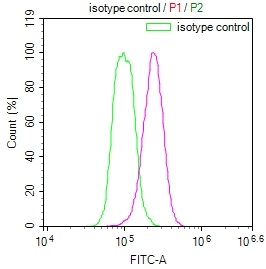TTLL2 Antibody, FITC conjugated
-
中文名称:TTLL2兔多克隆抗体, FITC偶联
-
货号:CSB-PA863137LC01HU
-
规格:¥880
-
其他:
产品详情
-
产品名称:Rabbit anti-Homo sapiens (Human) TTLL2 Polyclonal antibody
-
Uniprot No.:
-
基因名:TTLL2
-
别名:TTLL2 antibody; C6orf104 antibody; Probable tubulin polyglutamylase TTLL2 antibody; EC 6.-.-.- antibody; Testis-specific protein NYD-TSPG antibody; Tubulin--tyrosine ligase-like protein 2 antibody
-
宿主:Rabbit
-
反应种属:Human
-
免疫原:Recombinant Human Probable tubulin polyglutamylase TTLL2 protein (401-592AA)
-
免疫原种属:Homo sapiens (Human)
-
标记方式:FITC
-
克隆类型:Polyclonal
-
抗体亚型:IgG
-
纯化方式:>95%, Protein G purified
-
浓度:It differs from different batches. Please contact us to confirm it.
-
保存缓冲液:Preservative: 0.03% Proclin 300
Constituents: 50% Glycerol, 0.01M PBS, PH 7.4 -
产品提供形式:Liquid
-
储存条件:Upon receipt, store at -20°C or -80°C. Avoid repeated freeze.
-
货期:Basically, we can dispatch the products out in 1-3 working days after receiving your orders. Delivery time maybe differs from different purchasing way or location, please kindly consult your local distributors for specific delivery time.
-
用途:For Research Use Only. Not for use in diagnostic or therapeutic procedures.
相关产品
靶点详情
-
功能:Probable tubulin polyglutamylase that generates side chains of glutamate on the gamma-carboxyl group of specific glutamate residues within the C-terminal tail of target proteins. Similar to TTLL1, may acquire enzymatic activity only in complex with other proteins as it is most likely lacking domains important for autonomous activity. Probably involved in the side-chain initiation step of the polyglutamylation reaction rather than the elongation step.
-
基因功能参考文献:
- Characterization of another human tubulin tyrosine ligase-like gene family member PMID: 11054573
-
蛋白家族:Tubulin--tyrosine ligase family
-
组织特异性:Testis.
-
数据库链接:
Most popular with customers
-
-
YWHAB Recombinant Monoclonal Antibody
Applications: ELISA, WB, IHC, IF, FC
Species Reactivity: Human, Mouse, Rat
-
Phospho-YAP1 (S127) Recombinant Monoclonal Antibody
Applications: ELISA, WB, IHC
Species Reactivity: Human
-
-
-
-
-



















